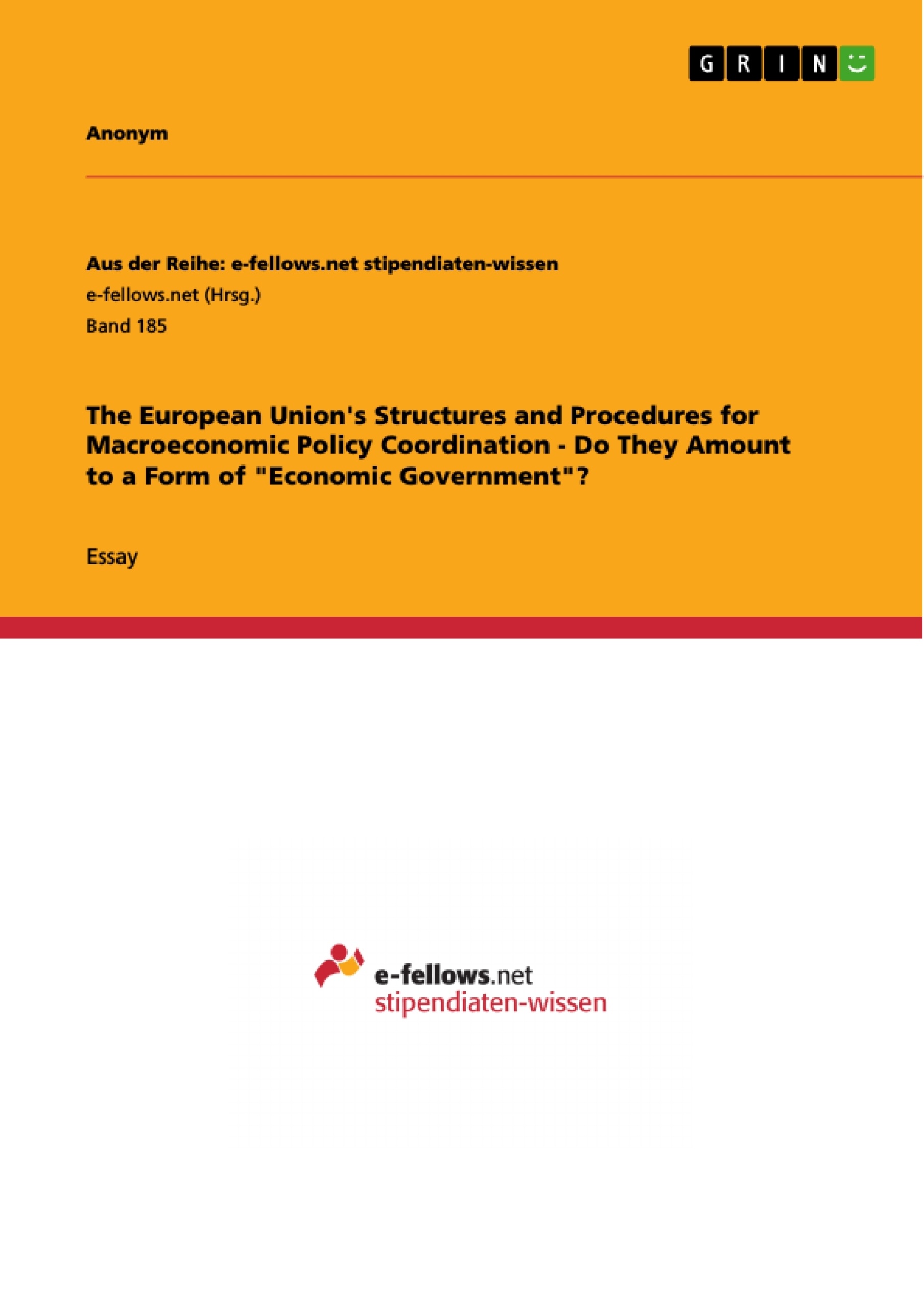“To become the most competitive and dynamic knowledge-based economy in the world, capable of sustainable economic growth with more and better jobs and greater social cohesion” was the main objective at the Lisbon European Council meeting in 2000 (European Commission, 2002). A decade later – in March 2010 – the Commission set a new strategic goal under the name “Europe 2020”. Achieving a “new economic policy coordination process” and again “smart, sustainable and inclusive growth” are the aims of this strategy announced by the Commission in 2010 (European Commission 2010). It becomes obvious that realising these goals requires harmonious coordination of macroeconomic policies. Therefore, this essay explores the different structures and procedures in place to coordinate the macroeconomic policy in the European Union (EU). It will focus upon fiscal and monetary policy-making as well as the Broad Economic Policy Guidelines and the Stability and Growth pact against the background of current debates. Identifying gaps in the policy-making processes will be the emphasis of the first part whereas the second part will be devoted to the exploring whether a form of “Economic Government” exists. This essay argues that the discrepancy between supranational monetary policy-making and national fiscal policy-making is an obstacle to the achievement of “Economic Government”. Due to increasing interdependence in form of institutions such as the Single Market and especially the introduction of the Economic and Monetary Union (EMU), coordination has become an imperative. In the view of the European Commission (2002), coordination of economic policies is highly desirable in order to “account for direct cross-border spillover effects of national policies on neighbouring countries”. For instance, policy decisions on a national level have an impact on the inflation and exchange rates, which in turn influences the European Central Bank’s (ECB) policy decision-making. Begg et al (2003) categorise arising expenses as social costs, as established fiscal policies become destructive to previously implemented guidelines and harm the stability of the overall coordination. Thus a coherent coordination system reduces social costs. [...]
Inhaltsverzeichnis
- Macroeconomic Coordination - An Imperative
- Fiscal Policy-Making and the Role of the Member States
- Monetary Policy-Making and the Role of the ECB
- Overview of the Coordination Procedures
Zielsetzung und Themenschwerpunkte
Der Essay analysiert die Strukturen und Verfahren der makroökonomischen Politikkoordination in der Europäischen Union (EU). Er befasst sich insbesondere mit der Frage, ob diese Strukturen und Verfahren eine Form von „Wirtschaftsregierung“ darstellen.
- Analyse der Strukturen und Verfahren der makroökonomischen Politikkoordination in der EU
- Untersuchung der Rolle von Fiskal- und Geldpolitik bei der Koordinierung
- Bewertung der Wirksamkeit bestehender Mechanismen zur Koordinierung
- Diskussion der Herausforderungen und Grenzen der makroökonomischen Politikkoordination in der EU
- Bewertung des Konzepts einer „Wirtschaftsregierung“ im Kontext der EU
Zusammenfassung der Kapitel
Macroeconomic Coordination - An Imperative
Dieses Kapitel stellt den Kontext für die Analyse der makroökonomischen Politikkoordination in der EU dar. Es werden die Ziele der EU in Bezug auf Wirtschaftswachstum und soziale Kohäsion erläutert, sowie die Notwendigkeit einer effektiven Koordinierung der makroökonomischen Politik betont. Das Kapitel geht auf die Herausforderungen ein, die sich durch die Interdependenz der EU-Mitgliedstaaten ergeben, und die Notwendigkeit eines kohärenten Koordinierungssystems, um soziale Kosten zu minimieren. Es wird auch die Bedeutung von Konsens und Dialog in der Koordination hervorgehoben.
Fiscal Policy-Making and the Role of the Member States
Dieses Kapitel konzentriert sich auf die Rolle der nationalen Regierungen in der makroökonomischen Politikkoordination. Es werden die wichtigsten Entscheidungsgremien der EU im Bereich der Fiskalpolitik vorgestellt, insbesondere der Rat für Wirtschaft und Finanzen (ECOFIN) und die Eurogruppe. Das Kapitel beleuchtet auch die Herausforderungen der Koordinierung der Fiskalpolitik zwischen den Mitgliedstaaten und die Notwendigkeit, die Rolle der Eurogruppe zu stärken.
Monetary Policy-Making and the Role of the ECB
Dieses Kapitel befasst sich mit der Europäischen Zentralbank (EZB) und ihrer Rolle in der makroökonomischen Politikkoordination. Es werden die Aufgaben und Ziele der EZB im Bereich der Geldpolitik erläutert, sowie die Frage der Unabhängigkeit der EZB und ihre Rechenschaftspflicht diskutiert. Das Kapitel geht auch auf die Herausforderungen der Koordinierung von Geldpolitik und Fiskalpolitik ein und die Frage, ob eine einheitliche Wirtschaftsinstitution für die EU notwendig wäre.
Schlüsselwörter
Die wichtigsten Schlüsselwörter und Fokusthemen des Textes umfassen: makroökonomische Politikkoordination, Europäische Union, Fiskalpolitik, Geldpolitik, Europäische Zentralbank (EZB), Wirtschaftsregierung, Interdependenz, Stabilität und Wachstum, Eurogruppe, Entscheidungsgremien, Harmonisierung, Verfahren.
- Quote paper
- Anonym (Author), 2010, The European Union's Structures and Procedures for Macroeconomic Policy Coordination - Do They Amount to a Form of "Economic Government"?, Munich, GRIN Verlag, https://www.grin.com/document/176970




